|
Every year people all over our country gather together to celebrate Thanksgiving on the third Thursday in November. This secular American tradition is enriched from the Catholic perspective. The word Eucharist comes from the Greek word eucharistia and literally means “thanksgiving.” Each day we have the wonderful opportunity to gather at the altar for the celebration of the Mass – the greatest feast of all – to be filled with the body, blood, soul and divinity of Jesus who saves us. It is a heavenly banquet that nourishes us for carrying out our mission here on earth: to LOVE. It is our closest connection with our salvation and we are invited to enter into this feast as frequently as possible. We remember, we celebrate, we believe as Catholic missionaries the act of love Jesus did to save us and we celebrate with thanksgiving that we are shown mercy endlessly. This year has been wrought with a devastating virus, severe political division, and unrest that have blanketed our nation with fear, sorrow, and hatred that tests our faith. We are living in a time that has brought out the worst of human behavior and emotions. We are facing continual unknowns and our peace seems greatly disturbed. The evil one is prowling, seeking the ruin of souls. But through everything that has been happening this year, one constant remains: Jesus is our living bread that sustains us and infuses us with the grace to persevere and even find peace and joy amidst such strife! We have been promised throughout all time that God has the victory! We cling to this truth and it is cause for giving thanks. Our Thanksgiving holiday this year can be more festive, more joyfully celebrated together because we believe and are confident that our great God is with us and in us and works through us – no matter the circumstances. Because of His love for each of us, we give thanks. Because of His steadfast care for us, we give thanks. Because of His promise that He will deliver us from all evil, we give thanks. Because of His eternal presence with us in the sacrifice of the Mass to feed us spiritually and physically, we give thanks. I believe if we all practice giving thanks intentionally while growing in love, we will be witnesses to the elimination of many of the troubles of our time. So let us all celebrate this wonderful American tradition wholeheartedly, and also be purposeful in celebrating our thanksgiving daily – and our fears, sorrows, hatred and divisions will be overcome. With God all things are possible; He is always victorious! Let us gather together in love for each other, singing and sharing with joy. Our faithfulness to this purpose will be transformative in all the world! Happy Thanksgiving!
0 Comments
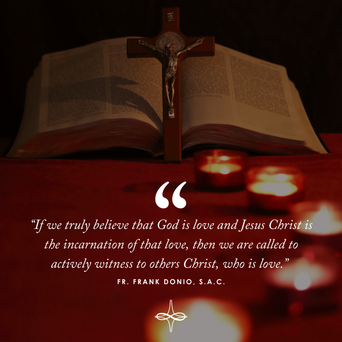 Advent is a time of active waiting. That might seem rather strange and even contradictory. Some see Advent as a passive period, a time of waiting for Christmas to come. Advent is hardly a time for passivity. The first half of Advent is focused on the coming of Jesus Christ at the end of time and our active waiting for that. What type of activity? We are called to co-responsibility in the mission of Christ and his Church to bring about the Kingdom of God. This Kingdom is not about power and control, but about love, particularly “social love,” a term used by St. John Paul II in his first Encyclical Letter, Redemptor Hominis (15). It is a type of love that transforms the world to Christ. Pope Francis in his new Encyclical Letter, Fratelli Tutti, teaches that “‘Social love’ makes it possible to advance toward a civilization of love, to which all of us can feel called.” (183). If we truly believe that God is love and Jesus Christ is the incarnation of that love, then we are called to actively witness to others Christ who is love (1 John 4:7-21). This love can transform our world and help to bring about the Kingdom of God while we wait for Christ to come again at the end time. May we enter Advent as a time of active waiting lived in love. May the Charity of Christ urge us on!
11/19/2020 Fratelli Tutti: On Fraternity and Social Friendship - Top Quotes from Pope Francis' Latest EncyclicalRead NowOn the vigil of the Feast of St. Francis of Assisi, the saint who influenced the choosing of Pope Francis’s papal name, Pope Francis released the encyclical Fratelli Tutti on fraternity and social friendship. Beginning with the example of St. Francis himself and continuing with the parable of the Good Samaritan, Pope Francis calls the world once again to consider the common good and to strive for unity based on fraternal charity. In doing so, he reminds humanity of an important truth: that we belong to one another. In this blog series, I’ll be sharing some of my favorite quotes from the pope’s latest encyclical. May they bring you peace, hope, and joy as we continue to grow and adapt in the midst of the COVID-19 pandemic and its effects on our world. “Let us dream, then, as a single human family, as fellow travelers sharing the same flesh, as children of the same earth which is our common home, each of us bringing the richness of his or her beliefs and convictions, each of us with his or her own voice, brothers and sisters all” (FT, 8) Today I believe that many of us have forgotten to dream. We are mired down with anxiety, isolation, pandemic fatigue, stress, financial and political uncertainty, or disillusionment. In Fratelli Tutti, Pope Francis reminds us to dream and to hope. There is room for each person at God’s table. Each person brings their own gifts, talents, knowledge, expertise, experiences, and self to the world. Rather than reject our differences, it is important to acknowledge and even celebrate the richness in our human diversity. We are many parts, but one body. Let us celebrate our humanity and practice dreaming once again—of unity, of peace, of justice, of truth, of love. “Instances of racism continue to shame us, for they show that our supposed social progress is not as real or definitive as we think” (FT, 20). As several incidents within the United States have reminded our nation once more, racism is a sin which directly contradicts the truth that all people are born with equal dignity in the image and likeness of God. The sin of racism continues to be present in our world, and eliminating it involves the intentional work and learning of each person. This process includes listening to other’s stories and journeys, learning about and from history, conducting a personal examination of conscience, and intentional action to change systems and structures of racism. Pope Francis reminds us that racism is intolerable, not only among Catholics, but among mankind as a whole. “True, a worldwide tragedy like the Covid-19 pandemic momentarily revived the sense that we are a global community, all in the same boat, where one person’s problems are the problems of all. Once more we realized that no one is saved alone; we can only be saved together” (FT, 32) Although the COVID-19 pandemic has wrought havoc on the way we live, times of hardship also remind us of what’s important. Often, we re-focus on our priorities because we are reminded not to take them for granted. Many turn to faith, family, and community and are more likely to help those who are less fortunate. Practicing gratitude is an essential component of not only surviving but thriving in times of hardship. Pope Francis points out that tragedies such as COVID-19 can bring humanity together in a common bond of fraternity. Let us turn outward during this time and use our talents and resources to bring joy, love, and hope to others. “We have the space we need for co-responsibility in creating and putting into place new processes and changes. Let us take an active part in renewing and supporting our troubled societies. Today we have a great opportunity to express our innate sense of fraternity, to be Good Samaritans who bear the pain of other people’s troubles rather than fomenting greater hatred and resentment” (FT, 77) Co-responsibility is an important theme at the Catholic Apostolate Center that has been given even greater attention in the Church today. It involves collaboration from the beginning and values the important contributions each person brings to the Church and world. St. Vincent Pallotti, patron of the Catholic Apostolate Center, understood that the Church cannot thrive and spread the Gospel without the active participation of the clergy, religious, and laity. Today, Pope Francis reminds us that we all have a role to play in the renewal of the Church and world. This begins when we can accompany our brothers and sisters, stand in solidarity with those who are hurting, and bring them the joy of the Gospel. “Solidarity finds concrete expression in service, which can take a variety of forms in an effort to care for others” (FT, 115) Charity comes alive in works, just as St. Paul says, “faith without works is dead.” The Gospel is lived today through our actions—an understanding promoted in Catholic Social Teaching and exemplified through the corporal and spiritual works of mercy. It is one thing to express solidarity with our brothers and sisters, but a very different thing to walk alongside and serve them. Pope Francis is calling us to both. As we are reminded in Gaudium et Spes, “Man…cannot fully find himself except through a sincere gift of himself” (24). “Nor can we fail to mention that seeking and pursuing the good of others and of the entire human family also implies helping individuals and societies to mature in the moral values that foster integral human development...Even more, it suggests a striving for excellence and what is best for others, their growth in maturity and health, the cultivation of values and not simply material wellbeing. A similar expression exists in Latin: benevolentia. This is an attitude that ‘wills the good’ of others; it bespeaks a yearning for goodness, an inclination towards all that is fine and excellent, a desire to fill the lives of others with what is beautiful, sublime and edifying” (FT, 112) In the Christian worldview, politics, economics, culture and society must be built and exist for the common good. They are man-made structures designed to serve this purpose. In pursuing the common good, we aim to create a society in which mankind can flourish as a result of respect for every person’s inherent dignity. As St. Thomas Aquinas stated, “Love wills the good of the other.” Pope Francis echoes this truth and reminds us that willing this good is comprehensive: we must care about one another’s spiritual well-being as well as our physical well-being. When man’s fundamental needs are met—when he is cherished, nurtured, respected, fed, and rested—he is better able to “fill the lives of others with what is beautiful, sublime and edifying.” He is able to reach out and better experience and rest in the divine. To learn more about Fratelli Tutti, please click here. Since the first day of my internship at the Catholic Apostolate Center, I have had many unique opportunities to grow in my faith. I have learned from examples of inspired Catholic leadership, and how resources, blogs, and podcasts can spread the faith. Perhaps the most significant lesson I have learned while working as an intern at the Center has been the importance of collaboration. One of the primary missions of the Catholic Apostolate Center is promoting the collaboration of parishes, dioceses, and organizations in order to develop the New Evangelization. Projects at the Center such as the Saint Project, blogs, podcasts, and retreats involve many different collaborators who bring a variety of professional backgrounds, strengths, experiences, and ideas to the table. As an intern, I have learned that when individuals come together to collaborate with a mission centered on Christ, something is created that is greater than the sum of its parts. While an intern, I often found myself asking my co-workers for advice based on their experiences and strengths. I realized that my own strengths were made stronger with the assistance, ideas, and advice of others at the Center. Through collaboration, projects are given a new life and energy and are able to more deeply impact others. In order to foster effective collaboration, I have learned that you must identify your own strengths and find a way for your gifts to complement or benefit those you are working with. In 1 Peter 4:10, Peter tells us that we have all been endowed with gifts that we must use “to serve one another as good stewards of God’s varied grace.” During my time with the Center, I have realized that one of my strengths is a diligent attention to detail that I used when working with others to edit and create biographies and videos sharing the lives of the saints. Others I have met at the Center have brought to the table their strengths of leadership, computer skills, writing in a way that elicits a positive response and an evaluation of faith, and the ability to think creatively in order to help others. While writing biographies on the saints, creating feast day videos, and editing for my work on the Saint Project, I have noticed a common theme of collaboration in the service and evangelization of the saints. For example, St. Vincent Pallotti, the patron of the Catholic Apostolate Center, spent most of his life doing missionary work and reviving the faith of the spiritually needy. He realized that he could not promote universal charity alone, and therefore created the Union of Catholic Apostolate to form collaboration among the lay faithful and religious in order to reach as many as possible. Blessed Elisabetta Sanna was a close companion of St. Vincent Pallotti and one of the earliest members of the Union of Catholic Apostolate. They worked closely together to spread the Faith and tend to the needy. Elisabetta even sold items she knitted to help fund the houses in which St. Vincent Pallotti welcomed the sick. Bl. Elisabetta and St. Vincent Pallotti show the beauty, effectiveness, and charity that can come from collaboration. St. Vincent Pallotti shows us that it is even possible to collaborate so in the midst of a wide-spread virus. In 1837, St. Vincent Pallotti and his fellow priests worked tirelessly to help those suffering from the Cholera pandemic. This example shows that collaboration must happen for the good of society despite any challenges. Today, it is very easy to simply go about our lives with little collaboration because we are isolated from others. However, now is an urgent time to go out of our way to collaborate for the good of others. People need a revival of faith and a reminder of God's mercy now more than ever. During my time at the Center, I have realized that despite separation as a result of COVID-19, collaboration of people of faith is still possible and can still create resources that inspire faith in others. 11/12/2020 Holy Detachment During COVID-19: Learning from the Examples of St. Vincent Pallotti and Fr. ChaminadeRead NowIn the last few years, Stoic philosophy has had a new renaissance in our modern culture. Based on the idea that we cannot control our outside surroundings, but can control how we respond, this ancient Roman philosophy is quite appealing to the twenty-first century—especially today when very little seems to be in our control. What I have found helpful from Stoic philosophy during this time is the understanding that we cannot control other people’s actions. We cannot control whether other people maintain social distancing or wear masks. In an election year, we cannot force the outcome that we feel is best for the country. We cannot control whether we work from home, whether schools open, or even when we can see friends. It can be disheartening to see the challenges around us. But a point of convergence between Stoicism and Christianity is an understanding of detachment that reminds us that, while the world is out of our control, we can control how we respond. We can wear masks, maintain social distancing, vote, or schedule virtual meet-ups. Most of all, as Christians, we can pray—turning to the One who is in control and who invites us to use our free will to cooperate with Him. During this pandemic, I have been reminded of one of my faith heroes, Blessed William Joseph Chaminade. As a priest in Revolutionary France, he must have felt like the apocalypse was here and now. Nevertheless, he went into hiding, offering the sacraments in shuttered rooms. When he was in mortal danger, Father Chaminade fled for Saragossa, Spain, where he prayed constantly to Our Lady of the Pillar. The Blessed Mother entrusted the exiled priest to form a society of priests and brothers who worked closely with the laity to re-Christianize France. I cannot help but compare his vision to that of St. Vincent Pallotti, patron of the Catholic Apostolate Center and founder of the Pallottine order. Both men passed away on January 22, 1850. Both of these men also had the Christian understanding of holy detachment to God’s will, as well as a commitment to cooperating with God’s grace to further build up the Kingdom. Rather than complain or say "woe is me," they saw that the world around them needed to change—beginning with themselves. They humbly realized that they could not do this alone, but rather relied on the strength of God: Father, Son, and Spirit. Learning about both of these men and living in a time with many similarities to that of Pallotti and Chaminade, I feel like my time at the Catholic Apostolate Center as an intern has been encouraging. I see the continuity of the spirituality of St. Vincent Pallotti and a convergence with some of the ideas of Father Chaminade. The Center, like these two holy men, promotes the collaboration of the laity and the clergy in building up the church and affirms that all the baptized are called to personal holiness. My internship with the Center has reminded me that life does get tough, but we have a bona fide solution: Jesus Christ. We can do little by ourselves, but when we unite with the Body of Christ, we come together through His inspiration and our actions are multiplied. I am proud to be an intern at the Catholic Apostolate Center, which lives out the rich tradition of the Pallottines. We are all on mission, working in the vineyard of the Lord. As servants of the Greatest Servant, we are called to walk with each other as we work. Through coffee breaks, check-ins, and many kind emails, I feel I am being accompanied—even during this strange work-from-home scenario. I know that my work with COVID resources and social media will not transform the world overnight, but working with a community of people who put Christ first can and will make waves. Our faith, especially as lived out in the persons of Chaminade and Pallotti, encourages us to come close to the Father, Son, and Spirit, who bring our humble work to new heights. In the autumn of 2015, I hit a major crossroad in my life. I was in the fall semester of my senior year at The Catholic University of America aspiring to be a missionary for at least a year of service after graduation. In the midst of many applications, however, something within me was not completely settled. What was this strange complexity I experienced? I knew well enough what I wanted to do, yet at the same time, the thought of doing missionary work did not satisfy me in terms of who I knew God wanted me to become. The honest truth is that I was avoiding a religious vocation I had felt a deep calling to since the time I was 15. Besides the normal sacrifices that accompany entering religious life, there was a particular cross that hovered over my zealous missionary dreams: I would, for the most part, never see the fruits of my apostolic work. That is because I was being called to the contemplative cloistered life as a Discalced Carmelite nun. Vatican Council II’s document Venite Seorsum states that “by vivifying the entire Mystical Body by the fervor of their love, and by bolstering the various efforts of the apostolate, which are indeed nothing without charity, contemplatives raise the level of the spiritual life of the whole Church.” Since I truly did believe this, what was holding me back? Perhaps I anticipated the experience of contemplatives who, though joyfully faithful to their life of intercessory prayer and penance, nevertheless often feel the deprivation of never seeing the beautiful results of their undeterred missionary zeal: of one’s student having come to faith in Christ, of a nursing Sister who receives the gratitude of her well-loved patients, of the missionary who thrills in taking the Gospel to far-off lands. Such was the interior crucifixion of St. Thérèse, who felt in her heart the vocation of an apostle, missionary, and martyr, yet discovered in her Little Way the secret of serving God as He desires. St. John of the Cross teaches that one act of pure love is worth more in God’s sight than all other works put together. I slowly realized that being a missionary disciple is not about what I wanted to do for God, as it was about allowing Him to transform my heart so that I would be willing to love for Love’s sake alone. A few days before my First Vows, my confessor told me that my religious Profession would purify me of sin to the extent that I was after my baptism “because Profession is an act of perfect charity; it is loving surrender that God desires.” My Profession gave me the key to my vocation: it is God who is on mission in my heart, in and through me. In closing, I invite you to prayerfully reflect with these questions: do I place more emphasis on what I want to do for God, rather than on developing a love-relationship with Him? Do I know that my life of prayer must be both one of contemplative intimacy alone with God, as well as mission? Do I insist on seeing the fruits of my labors, and if not, grow discouraged? Have I ever considered or studied the cloistered contemplatives’ role in the Church? Let us remain united in prayer and in mission! To learn more about vocational discernment, please click here. To learn more about Carmelite spirituality, please click here. 11/5/2020 The Power and Grace of the Sacraments: Reflections from Father Boucher During National Vocation Awareness WeekRead NowI really don’t spend much time on Twitter, and usually just end up logging in when someone sends me a link or I’m really trying to procrastinate. I found myself in the latter category the other day, and a tweet by Bishop Robert Reed (@BpRobertReed) of the Archdiocese of Boston stopped my scrolling fingers. His tweet read: “Not even a deadly virus can contain the power and grace of the Sacraments. Veni Sancte Spiritus!” Having just been ordained a priest at the end of August, everything is still pretty new to me. And that’s all in the midst of a pandemic! I’m now almost beyond the “firsts” of priestly ministry: first Mass; first confession; first anointing; first funeral… Yet, I’m constantly reminded of the great beauty, power, and grace of these sacramental and liturgical moments. Despite this terrible pandemic, “nothing can contain the power and grace of the Sacraments.” The Holy Spirit is still at work in our world, using the words and hands of priests to become present in a world that so desperately needs God. Now—more than ever—we need God and we need the sacraments. The sacraments of the Church are how God enters our lives in grace-filled encounters. As our Catechism reminds us, “The sacraments are efficacious signs of grace, instituted by Christ and entrusted to the Church, by which divine life is dispensed to us” (CCC, 1131). The sacraments are efficacious, which means that they do something. They aren’t just nice things that pious believers receive to make them feel better. There is power and grace in each sacramental encounter, where we receive a share in the “divine life” of God. What a great gift that God freely gives us! This week, the Church celebrates National Vocation Awareness Week. We each have a unique call, a unique vocation from God. We received that call through the grace of our baptism, “the basis of the whole Christian life, the gateway to life in the Spirit” (CCC, 1213). God calls and invites some of the baptized to respond to the grace of baptism by serving Him, the Church, and the People of God through vocations to the priesthood, diaconate, and consecrated life. No matter which vocation God calls us to, we know that God desires our happiness and our holiness. We need courageous women and men at this important time in our Church and our world, and we should pray often for good and holy vocations to build up the Church. Come, Holy Spirit! “Let us try to do great things for the glory of our Creator and recall that it is divine grace which sanctifies us and makes us saints. Therefore I am very confident that our heavenly Father will fill us with such a grace. The love of God and Jesus should drive us on to do everything. Caritas Christi urget nos.” (Opere Complete, Volume X) -St. Vincent Pallotti For helpful resources about vocational discernment, please click here. When I was in seventh grade, about the age of 12, I decided to plan my life. I thought that I urgently needed to have an idea and start preparing for my future. I decided that I would be a missionary. I wanted to go to Africa and care for the children, especially those in most need. I always desired to adopt many children, including many with different disabilities. However, the missing piece of my life puzzle was that I didn’t even know what “being a missionary” really meant, and I had never thought about how my vocation would fit into my life either. As time went on, I realized that it was true that I loved to be around and work with children, and I had a great desire in my heart to go out to the whole world to help those in most need. However, I also discovered that God had a very special calling and plan for me, to use me as His instrument. As Mother Teresa said, “I am a little pencil in God’s hands. He does the thinking, He does the writing. He does everything and sometimes it’s hard because it is a broken pencil and He has to sharpen it a little more.” My name is Sister Mary Altar of Sacrifice, and I grew up in Kansas City, Kansas and went to Catholic school my whole life, from kindergarten through college. Thanks be to God, I was given a Catholic upbringing not only at school but also at home. Although I have a truly bad memory, I distinctly remember the different moments of the sacraments in my life, and I believe that it was the grace of the sacraments that opened my heart and led me to discover my religious and missionary vocation. Preparing for First Communion, I remember arguing with my mom about not wanting to wear the fancy white dress. I really disliked dresses because I was a tomboy who grew up with 3 older brothers. However, I understood the importance of the sacrament and was so excited to receive Jesus that I knew that I had to look my very best! It wasn’t until I was preparing for the sacrament of Confirmation that I began to take my Catholic faith seriously and hold it as my own. Our religion teacher told us “this is the moment (Confirmation) that you become an adult in the Church and have to take your faith as your own, so you must decide what you will do with it!” After that, I continually got more involved in the Church throughout high school by joining the youth group, aiding with junior high youth group, lectoring, being a Eucharistic Minister, leading retreats, frequenting the sacraments of confession and communion, etc. I also had the opportunity to do a 2-week mission trip to Peru, which confirmed my early desire to do mission work abroad. The experience of leaving all behind to go serve another was exciting and invigorating. I could concretely see that these people materially were poorer than I, but to see the richness of the treasure of their faith was enlightening. Finally, the time came for me to decide which college I would go to. I decided instead that I would do a gap year of service in another country, but my parents had other plans for me, so my “missionary adventure” was put on hold. Thanks be to God, I decided to go to Benedictine College, where I fell even more in love with Jesus and my Catholic faith, discovered my religious vocation, and finished my degrees in Elementary and Special Education. A month after graduation, I entered the convent in Washington D.C. with the Servants of the Lord and the Virgin of Matara, a missionary order founded in Argentina and currently in over 40 countries. When I visited them for the first time during college, there was a moment of actual grace that I understood this is where God was calling me to fulfill my vocation, and here, He would fulfill all the desires of my heart. I could see the puzzle pieces all fit perfectly together. Now, I am currently a missionary in Papua New Guinea in Oceania and have been here for just over a year. My main apostolate (or missionary work) is in the Primary School of our parish, teaching and working to bring a higher level of integral education to our students. Since I have entered religious life, every day has been a “missionary adventure.” However, being a missionary doesn’t just mean going to another country. Through our Baptism, we have been called to follow Jesus and sent to be missionaries to the world. The first step is to evangelize ourselves. We must look at our life and ask, “am I truly living the Gospel in my daily life and following Jesus in everything I think, say, and do?” Then, we must complete Christ’s mandate to love our neighbors and bring the Gospel to those closest to us. Sometimes, this is even more challenging than leaving our own family and country to serve someone. We must learn to be missionaries in our daily lives and pray and discern to see where and how God is calling us to fulfill that mission. Some have a special calling to give their whole lives as priests or religious to do this work! In addition, God calls some—priests, religious, and laity—to be missionaries abroad. However, we, as Catholics, are all called to be missionaries. As St. Catherine of Siena said, “If you are who you were meant to be, you will set the world on fire!” So, I invite you to pray for the missions and all missionaries in the world in a special way during this month of missions, but also I invite you to take some time to listen and pray about how God is calling you to be a missionary in your life. For more resources on Vocational Discernment, please click here. AuthorSister Mary Altar of Sacrifice serves as a religious missionary in the Diocese of Vanimo, Papua New Guinea |
Details
Archives
July 2024
Categories
All
|
About |
Media |
© COPYRIGHT 2024 | ALL RIGHTS RESERVED

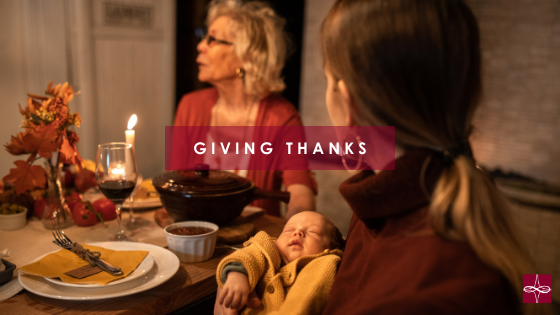

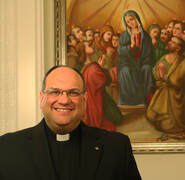
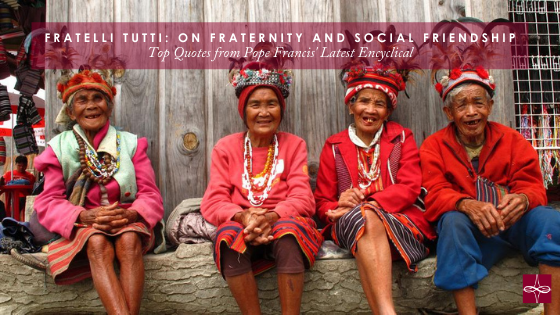



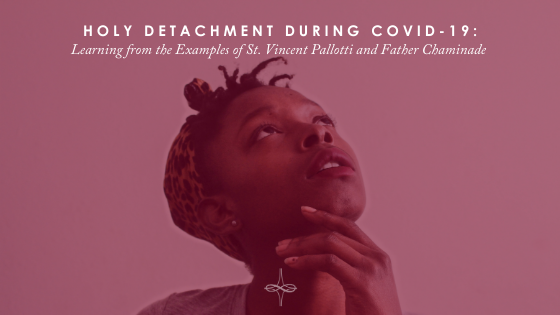
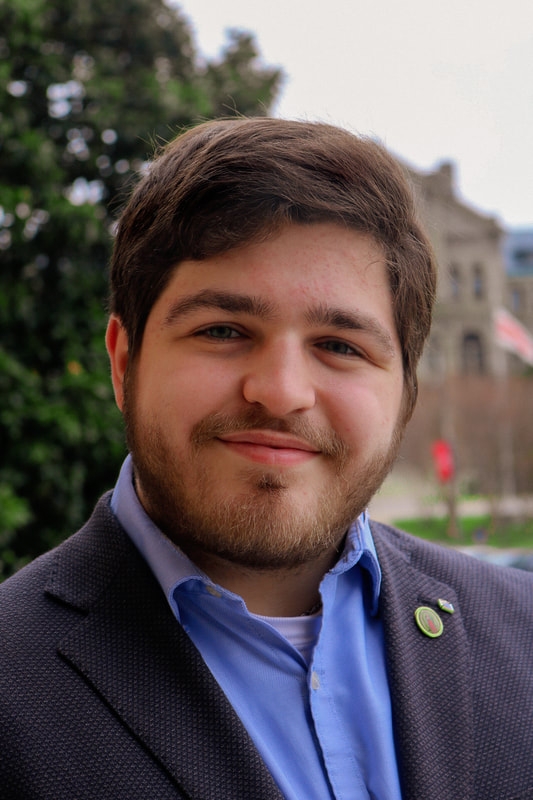

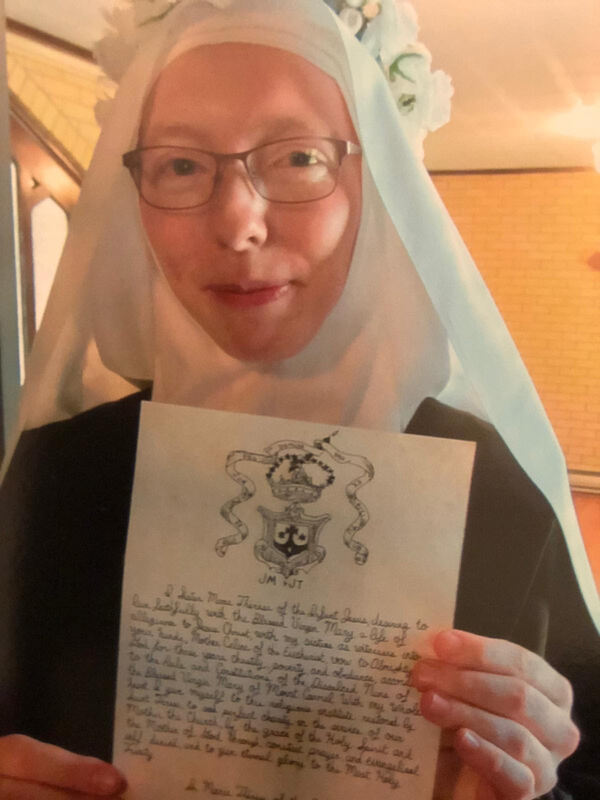
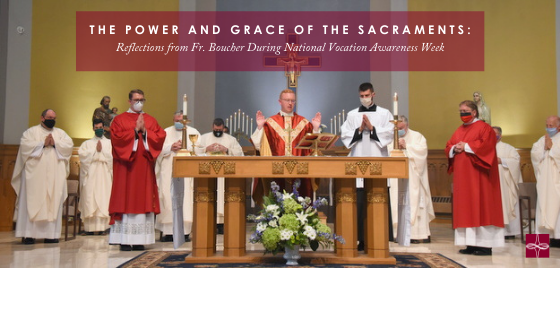
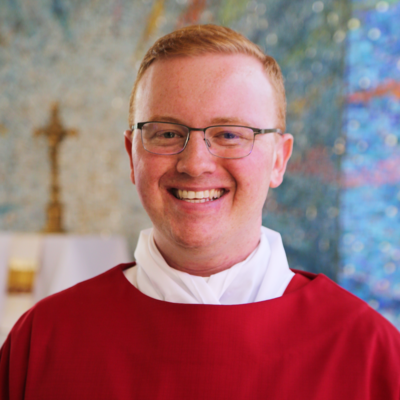
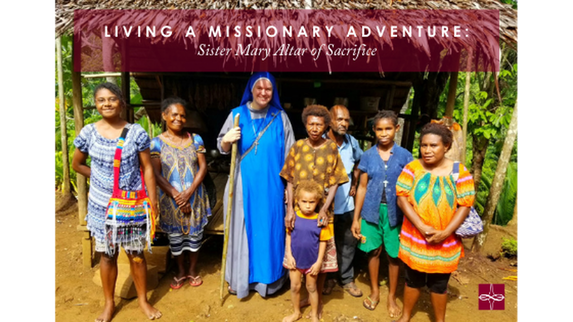
 RSS Feed
RSS Feed